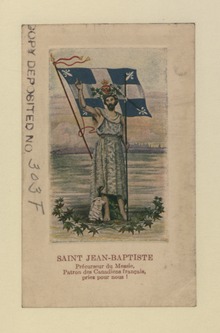Clerico-nationalism
You can helpexpand this article with text translated fromthe corresponding articlein French.(March 2023)Click [show] for important translation instructions.
|

Clerico-Nationalismwas aright-wingideologycurrent inQuebecfrom the years afterWorld War Iuntil the end of the 1950s, (from the premiership ofMaurice Duplessisuntil theQuiet Revolution). Clerico-nationalism was a traditionalist, religious form ofFrench Canadiannationalismfocused on theRoman Catholic Church.InFrance,a similar ideology was referred to asNational Catholicism.
Ideas
[edit]
The term clerico-nationalism was coined byPaul-André Linteau.Henri Bourassapublicized clerico-nationalist views, as did the editors of his newspaperLe Devoir,and the League des droits du français (League of French Rights). Clerico-nationalist thinking was most thoroughly developed and spread byLionel Groulxand the Ligue d'Action française (French Action League), which he led.
Clerico-nationalism was focused on the past. Clerico-nationalists pushed a conservative line in politics and defended the interests of what they called the French Canadian race. Advocates of clerico-nationalism were strictly Catholic and mostly members of the clergy. They defended traditional family values, respect for hierarchy, submission of the wife to the authority of her husband, andnatalism.They also defended agriculture and the rural way of life. They were on guard against what they saw as the dangers of the city and praised popular religious education.[1]
Clerico-nationalists also took stands on language and culture. They were purists about theFrench language,preferring theFrenchspoken in France as the standard form of the language. In terms of culture and literature, Groulx and his fellows were traditionalists and opposed to modernist French and European. They promoted rural, conservative, and nationalist literature which opposed exoticism, art in the Parisian style, orParnassianism,which was characterized by the study of 'art for art's sake'.
Opposition and decline
[edit]Starting in the 1930s, other more radical nationalist ideas (secularistandseparatist) began to coalesce. These reduced the influence of Clerico-nationalism. These more radical ideas took hold in the movements inspired byPaul BouchardandAdrien Arcand,and the groupJeune-Canada(Young Canada).
In the 1940s, opposition to the ideology of Groulx's generation became more vigorous. The young artists ofRefus global,centered aroundPaul-Émile Borduas,strongly rejected clerico-nationalism, which they believed was reactionary. They were modern, anti-clerical, and revolutionary. This opposition had little effect at the time, but the generation of the Quiet Revolution would later rediscover it, opening the door toMarxismand the far left.
After the premiership of Duplessis Clerico-nationalism, often associated with his government, progressively gave way to the liberalism represented byJean Lesage.However, the ideology represented by Groulx and his successors during close to a quarter century was a major influence on Quebec history in the 20th century. Clerico-nationalism brought together a number of intellectuals and figures from different nationalist milieus in defense of French Canadian tradition against rising liberalism, secularism, urbanization, and capitalism in the.[clarification needed]The often passionate debates that Clerico-nationalism stirred up focused discussion on modernity, the influence of Catholicism on political life, and the idea of progress in Quebec during a turning point in its history.
See also
[edit]- Parti nationaliste chrétien(1967-1970)
- Parti Unité Nationale(2000-2018)
References
[edit]- ^Anderson, Emma (November 18, 2013).The Death and Afterlife of the North American Martyrs.Harvard University Press. pp. 112–115.
Bibliography
[edit]- Paul-André Linteau, René Durocher et Jean-Claude Robert, "Le courant clérico-nationaliste", dans Histoire du Québec contemporain. De la confédération à la crise (1867-1929), Montréal, Boréal, "Compact", 1989, t. 1, p. 700-707.
